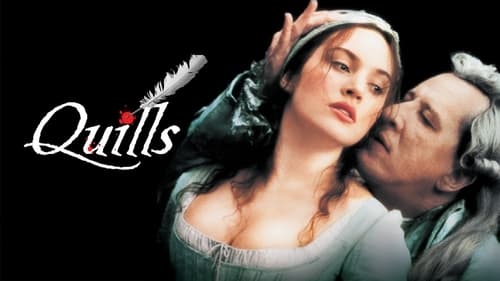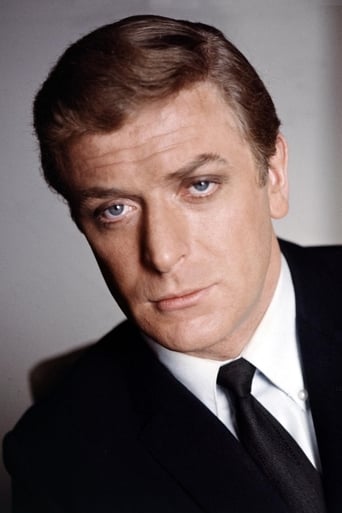Stometer
Save your money for something good and enjoyable
Rosie Searle
It's the kind of movie you'll want to see a second time with someone who hasn't seen it yet, to remember what it was like to watch it for the first time.
Philippa
All of these films share one commonality, that being a kind of emotional center that humanizes a cast of monsters.
Cheese Hoven
My main problem with this is that it bears absolutely no relation to the truth of De Sade's stay at Charenton. A full list of these can be found at Quills' wikipedia page, but the most horrendous are the torture and tongue removal of De Sade, neither of which took place. The real De Sade died peacefully in his sleep in his 70s and had been freely allowed to write (he also did not write anything sexual while at Charenton).The question is, why is the truth so much distorted? Is it to make the (rather weak) point that De Sade was a champion of free speech while his opponents were pious hypocrites? Such a point is really not worth making especially since De Sade was originally committed not for his writings but he actual crimes, such as rape and attempted murder.Whatever the intention, Quills amounts to a historical slander against Abbe du Coulmier (here depicted as a sexually repressed if well meaning liberal) but more especially Dr Royer-Collard, shown as a rapist, paedophile and torturer! There are some interesting ideas along the way. The Marquis' reductionist view of humanity "we eat, we sh*t, we f*ck" is challenged by the Abbe "but we also fall in love and write symphonies" but this is sadly not taken any further. Other ideas, such as to what degree pornography can provoke rape, as it does near the end, are also under developed.Instead we have plenty of time for wallowing in a soft porn version of the 18th century. Literally all the 'lower orders' are aroused by De Sade's writings, even those old enough to know better, such as the ageing blind mother of the maid. They cavort about in their underwear playing with themselves while the stories are read out or engage in free love. Implausibly Royer-Collard's virginal wife, fresh from a nunnery, has acquired a copy which she avidly reads. And amazingly, the ringleader in this vice, the maid (played by Kate Winslet) is revealed to be a virgin in the end! Mirable Dictu! By contrast all the authority figures are shown as being hypocritically outraged by De Sade's work. Now, an interesting discussion could be had about the merits of pornography both as satire and as a freedom of expression, but they are not had here. Nor is the idea of sex as forbidden fruit really explored other than in this cartoonish way. The real impact of De Sade's ideas are only hinted at near the end, when the aforementioned attempted rape occurs but this is quickly undermined by the dishonest amputation of De Sade's tongue which gives the impression that society is merely trying to silence the messenger.The performances are variable. Geoffry Rush gives his usual commanding performance, while Phoenix effects his English accents. Winslet is so-so in a role which is unconvincingly written
dragokin
Quills was not the only film about Marquis de Sade in 2000. It was more of a theatrical experiment, though, whereas French movie Sade offered an almost philosophical discourse.The premise here was that Marquis de Sade had been a whimsical old man. Not sure why this was the case, since the historical figure was a mere pervert with homicidal tendencies.The premise, in turn, follows a trend in contemporary art and culture, where Marquis de Sade becomes almost a free speech activist in today's terms.We might argue whether the film should follow historical facts or author's vision, but for me Quills deserves two stars.
Scarecrow-88
Geoffrey Rush stars as the notorious Marquis de Sade, languishing in an asylum, allowed some freedoms, though his appetites for causing a stir by way of his quill lands him in a lot of hot water. Kate Winslet, the laundress who moves his written work to the outside where it can be marketed underground to the people who love the Marquis' sordid tales of the violent and erotic. Joaquin Phoenix, the priest over Charenton mental institution, who treats the patients, including the Marquis, with humanity and kindness. Michael Caine, the medical scientist(more like certified torturer, whose methods include dunking the disturbed in water among other ways)who arrives at Charenton at an advisory capacity. Caine's doctor is ferocious and his way of curing the mentally ill is barbaric, a complete polar opposite to Phoenix who wants to keep his inmates free from vile experiments which do more harm than good.The movie amusingly asks us which one's worse, Caine's scientist or Rush's Marquis. Caine is commissioned by Emperor Napoleon to "cure" Marquis because death to such a quietly revered author might make him a martyr for the lower classes. The film shows how Caine's old man is married to a teenage virgin raised in a convent, and we see him force her into rough sex. Yet, his control over her is brief as she soon gains an advantage, his wanting to please her in ways sex can not used as a tool to get her way. Interesting development shows that Caine's wife is an avid reader of the Marquis..talk about irony.The depraved work thrown into the fire by an angered Napoleon is "Justine"..this is the work which repulsed him into action(a very funny scene shows Napoleon sitting upon his throne, his feet unable to touch the floor as if he were a child in a swing, legs flailing). When the Marquis pens a farce mocking Caine and his marriage to the young bride, set to a play designed to insult and ridicule for fun, he enacts a feud he will live to regret.The movie shows people appalled at the way the Marquis writes about his characters' "inadequacies" and devious pursuits and yet they remain curious and find his work even humorous, fighting off giggles.When the Marquis escapes from his cell, thanks to Winslet unlocking his door against her better judgment, Phoenix is forced into a predicament he'll never be able to recover from, his decency towards the patient rewarded with disregard. Basically, upon Caine's arrival, everything the priest had built falls to ruin. By the end, the lives of many will be shattered, death and anguish to all through Caine's actions. Though, despite all his underhanded tactics, no matter what he was able to accomplish in scoring a revenge against the Marquis for his wife's leaving him for a talented home decorator, influenced by the depravity and vice written by his hand, the author's work lives on no matter what the conniving scientist does to him.The movie shows that no matter what punishments are dealt him(remove his means to write, such as quills and paper, cloth and wine, etc), the Marquis finds ways to get his work to the outside world. Eventually, the evil scientist does get rid of the man, and he even sets up a printing factory using the inmates to distribute the Marquis work at the author's wife's permission, but halting the power of the one he so despises will never be easy as long as Phoenix's defrocked priest keeps his memory afresh. QUILLS includes an erotic scene where Phoenix fantasizes making love to a ravishing Winslet and Rush devours his scenes like a mutt with rabies. It's easy to see that Rush summoned the spirit of Marquis de Sade while portraying the role, I thought he wholly brought him to life in QUILLS. The asylum itself can be presented as both a refuge for the inmates and a bleak place once Caine's presence constrains the freedom they once had, his power attributing to the very Emperor who gave him absolute authority to see that order is kept."My most glorious prose..filtered through the minds of the insane."
minamurray
Place is early 19th century France, a handsome but cold place of elegance, squalor and violence, and "witty" porn writer Marquis De Sade (Geoffrey Rush) has sent to Charenton asylum, albeit for political reasons rather than insanity (at least in real life). Asylum is led by kind Catholic priest (Joaquin Phoenix as rather sympathetic character who was apparently very short and hunchbacked in real life) and he has scandalous notion that mentally ill do not need torture. Gasp! Where is this world going to, if filthy perverts cannot torture insane? Soon, De Sade's writings - which later inspired such celluloid filth than Salo - are somehow "liberating" whole France to orgy and enraging Napoleon, when laundry maid is carrying the smut out, turning Marquis as trashy bestsellerist in the vein of Stephen King. Michael Caine has chilling role of outwardly respectable but sleazy pervert, who gets his kick by torturing insane and raping his young porn-reading wife, and Rush does not physically resemble De Sade, albeit complaints seems not come from only desire to historical accuracy but mucky morality worthy of De Sade: being filthy scatological perv and sadist, totally sane but locked in asylum, is somehow better if the perpetrator is not short and fat. Why his character openly courts danger and torture when he gets possibility to keep his cushy lifestyle, if he just does not publish his stories and endanger anyone, is something I cannot fathom. More entertaining than horribly wooden Sade (2000), but screenwriter Doug Wright who has adapted his own play lets historical inaccuracies gallop horribly wild, especially in the tragic - and frankly heavyhanded - ending.






